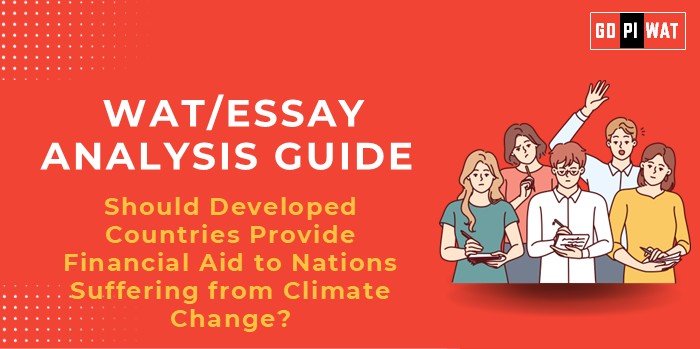📋 Written Ability Test (WAT)/Essay Analysis Guide
🌍 Should Developed Countries Provide Financial Aid to Nations Suffering from Climate Change?
💡 Understanding the Topic’s Importance
The essay explores the moral, economic, and political dimensions of global climate equity, emphasizing the role of financial aid in addressing the imbalance between those most affected and those most responsible.
🕒 Effective Planning and Writing
- ⏳ Time Allocation (30 min):
- 📖 Planning: 5 min
- ✍️ Writing: 20 min
- 🔄 Review: 5 min
- 📋 Structure:
- 🔍 Introduction: Contextualize the topic with a powerful statistic or quote.
- 📊 Body Paragraphs: Discuss achievements, challenges, and future solutions.
- 📜 Conclusion: Offer a balanced perspective or policy recommendations.
✨ Introduction Techniques
- 💡 Contrast Approach: “While developed nations contribute over 78% of global emissions, vulnerable nations bear 80% of climate-related damages.”
- 🌱 Solution-Based: “Climate aid represents an opportunity to rectify historical injustices and foster sustainable global growth.”
📊 Structuring the Essay Body
🏆 Achievements:
- 🌾 Success stories like Bangladesh’s resilience initiatives funded by climate aid.
⚠️ Challenges:
- 📉 Highlight misallocation and political resistance.
🔮 Future Outlook:
- 💡 Propose innovative solutions like blended finance or private-public partnerships.
📝 Concluding Effectively
- 🔄 Balanced Perspective: “Financial aid is a cornerstone for climate justice, but its success lies in accountability and equitable allocation.”
- 🌐 Global Comparison: “Lessons from Norway and Germany underscore how focused climate aid fosters both equity and innovation.”
📈 Sample Short Essays (100 Words)
1. 🏛️ Balanced Perspective:
“Developed nations, as major contributors to global warming, bear a moral and strategic responsibility to aid vulnerable nations. However, financial aid must be complemented with capacity-building and technology transfer to ensure sustainable outcomes. Only through equitable and transparent mechanisms can we achieve global climate resilience.”
2. 💡 Solution-Oriented:
“Financial aid to climate-affected nations is essential but insufficient on its own. By integrating aid with renewable energy projects, skill development, and international cooperation, developed nations can foster lasting change. The global nature of climate change demands collective action rooted in justice and innovation.”
3. 🌍 Global Comparison:
“Norway and Germany’s leadership in climate finance demonstrates how strategic aid builds global resilience. If other developed nations follow suit, the $100 billion climate finance goal can be achieved, offering a lifeline to nations on the frontlines of climate change.”


